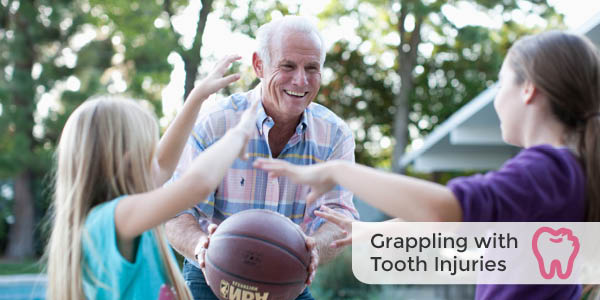7 Tooth-Saving Tips for Full-Contact Sports
This time of year the weather shifts to longer, warmer, and brighter days allowing families who have been in hibernating to begin enjoying some of their favorite outdoor activities again. From hiking and biking to actively engaging in sports like baseball and soccer, the fun factor is high and so is the opportunity for dental disasters.
There are many ways to protect you and your children’s teeth while enjoying the active side of life. Mouth guards and helmets are a must, but even with the best precautions in place, that unexpected spill from a bike or a missed footstep on the trail can quickly lead to a dental emergency. While you can’t predict when a dental emergency will happen the following tips will help you navigate every thing from a broken tooth to damaged orthodontics so you can get back to enjoying your springtime fun in no time at all.
- Knocked-Out Tooth: Rinse the tooth carefully, making sure not to wash away any remaining tissue. Attempt to place the tooth back in its socket carefully. If this is not possible, place it in a container of milk, or water with a pinch of table salt. Call your emergency dentist immediately. Your tooth has the best chance of being saved if you are seen within an hour of having it knocked out.
- Chipped, Cracked, and Broken Teeth: Gather and rinse all broken pieces of the tooth. Rinse your mouth with warm water and apply gauze if there is bleeding. Use a cold compress to relieve pain and swelling in the injured area, and contact your emergency dentist to be seen immediately.
- Fractured Tooth: Dentists can easily fix fractures with a composite restoration. A dentist should be seen within a couple days of the injury.
- Partially Dislodged Tooth: When a tooth gets pushed out of its proper position, it is important to manage the pain and get into your emergency dentist immediately. Apply a cold compress to the area and take a pain reliever such as acetaminophen or ibuprofen as needed.
- Lost or Broken Crown: Save your crown and set up an appointment with your emergency dentist right away. If possible, use over-the-counter dental cement to reattach the crown. If there is any pain, take an over-the-counter pain reliever such as ibuprofen or acetaminophen. Clove oil can also be used to soothe sensitive areas.
- Broken Braces: Orthodontic wax can be used to cover or temporarily reattach loose brackets and broken wires. If a broken wire is poking out and into your cheek or tongue, use the eraser end of a pencil to move it into a comfortable position, then cover it with wax, gauze, or cotton. See your orthodontist to have your braces repaired.
- Soft-Tissue Injuries: Tears, punctures, and lacerations to the soft tissues of the cheek, lips, or tongue should be cleaned and packed with gauze. A trip to the emergency room is necessary if stitches are needed.
If you or your children are considering joining a full-contact sport, preparing for a dental emergency is key to preventing tooth loss.
The following are a couple of items and information to have on hand:
- Dentist’s phone number and email address
- Small, portable container for dental emergency kit
- Saline solution
- Tissue
- Gauze
- Orthodontic wax
- Dental cement
- Compress
- Ibuprofen and/or acetaminophen
Finally, one of the most important steps you can take toward protecting your smile in any sports-related activities is talking to your dentist about a mouthguard. According to the American Dental Association, sport mouthguards have been shown to reduce the risk of sport-related dental injuries. Having a dental provider fit you with one that is resilient, comfortable, and durable could mean the difference between keeping or losing your teeth in a sports-related incident.
To find out more about mouthgaurds and protecting your teeth, call your Lancaster dentist today at (661) 952-7865.
More

